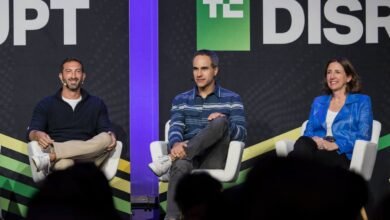Red Bull’s Secret Weapon: The Engineer Optimizing Workflows Like Lap Times

▼ Summary
– Laurent Mekies became Red Bull Racing’s CEO just four months ago, making him only the second leader in the team’s 20-year history after Christian Horner’s unexpected departure.
– Mekies brings a technical, engineering-focused approach to leadership, emphasizing performance gains through streamlined workflows and process improvements rather than media presence.
– He views partnerships like the one with 1Password as competitive advantages, reducing operational friction to save time and enhance team efficiency in a sport where milliseconds matter.
– Mekies demonstrates humility and a people-focused leadership style, prioritizing team culture and collective success over personal credit, as seen in his response to a recent race victory.
– Red Bull is undertaking a major challenge by building its own power unit for 2026 with Ford, competing against established engine manufacturers despite starting from scratch with new facilities and staff.
Behind the high-octane world of Formula 1, where victories are measured in milliseconds, Oracle Red Bull Racing’s new CEO Laurent Mekies is applying an engineer’s precision to leadership itself. Since stepping into the role just four months ago, Mekies has shifted focus from the spotlight to the systems, viewing streamlined internal operations as critical to maintaining a competitive edge. His unexpected appointment followed Christian Horner’s departure, placing the former Racing Bulls chief at the helm of one of motorsport’s most successful organizations.
At a recent Web Summit event, Mekies’s approachable nature was on full display when a production crew member, far larger in stature, pulled him aside for a selfie. Rather than showing any discomfort, Mekies smiled and accommodated the fan, a small gesture that reflects his unassuming leadership style. He describes the opportunity to lead Red Bull Racing as a privilege, joining a team that has dominated F1 for two decades.
Mekies’s background sets him apart from his predecessor. While Horner thrived on media attention and strategic mind games, Mekies built his career in engineering. This technical foundation shapes his philosophy: performance gains aren’t only found in aerodynamics or tire technology, but also in eliminating workflow friction and refining team processes.
This mindset extends to Red Bull’s partnerships, including their collaboration with cybersecurity firm 1Password. At first glance, a security company might seem an unusual partner for a racing team, where every delay is a liability. But Mekies argues that seamless security is essential. Team members constantly switch between complex systems, from aerodynamics and vehicle dynamics software to factory and simulation tools. With 1Password, login and logout times have been cut dramatically, preserving precious seconds for core tasks.
He emphasizes that in Formula 1, tiny advantages accumulate. “We chase the smallest competitive edges, one after another,” Mekies explains. “Our technical staff challenge us daily to reduce distractions. Tools like 1Password help cut through the noise, giving our people more time for innovation. That’s where real performance comes from.”
Mekies brings nearly 25 years of F1 experience to the CEO role. After studying engineering in Paris and the UK, he began in Formula 3 before moving to F1 with Arrows in 2001. He later served as a race engineer for Minardi, which Red Bull purchased and rebranded as Toro Rosso. There, Mekies rose to chief engineer, helping develop future stars like Max Verstappen. An eight-year stint with the FIA followed, where he championed the introduction of the cockpit “halo” safety device. He then joined Ferrari as deputy race director before returning to Red Bull’s junior team, now called Racing Bulls.
Despite his extensive resume, Mekies remains notably humble. When Verstappen won the 2025 Italian Grand Prix, the fastest race in F1 history, reporters asked about Mekies’s role in the victory. His reply was straightforward: “I have zero contribution.” On stage at Web Summit, he elaborated, “Leaders exist to position their people to succeed. The win belongs entirely to the team.”
He rejects the idea that leadership depends on a specific style. “What truly matters is caring for your people and fostering a supportive company culture,” Mekies states. While he values star drivers, his focus rests on the collective effort of Red Bull’s roughly 2,000 employees. “The first people I think of are those in the factories who never gave up this season. Sustaining that motivation and fighting spirit takes immense energy and a strong culture.”
This humility hasn’t stopped him from making bold decisions. Earlier this year, Red Bull was struggling with car performance. While most competitors shifted resources to 2026, a season with sweeping new regulations, Mekies insisted the team continue developing the 2025 car. “We weren’t satisfied with our early-season results,” he recalls. “We felt we had to understand what wasn’t working before moving forward. We pushed harder than some rivals, and fortunately, it led to a turnaround.”
As a result, Red Bull enters the off-season with less development time than competitors, but with greater confidence in their methods and tools.
Looking ahead, 2026 presents what Mekies calls a “crazy adventure.” For the first time, Red Bull is developing its own power unit in partnership with Ford, rather than relying on Honda-derived engines. “There’s no other way to describe next year except as a monumental challenge,” Mekies says. “We’re up against manufacturers with over 90 years of F1 engine experience. We’re building facilities from scratch in Milton Keynes, constructing buildings, installing dyno test rigs, hiring 600 people, and uniting them to produce a competitive engine. It’s the kind of ambitious project only Red Bull would attempt.”
When asked if he can promise Verstappen a championship-winning car next year, Mekies is candid. “It would be naive to think we’ll immediately match established engine makers. That won’t happen. But we’re embracing the Red Bull way, high risk, high reward.”
There is reason for optimism. Red Bull currently sits third in the team standings, close behind Mercedes, with a real chance to claim second in the final three races. This represents a significant recovery from their early-season struggles.
Before taking the stage at Web Summit, Mekies discussed the pressure of the season’s final races. His response was characteristically systematic. “We approach it race by race. The goal is to arrive at each track, optimize the car’s setup, and fight for the win. Competing at this level is incredibly difficult, but everyone in Milton Keynes has done extraordinary work to make the car competitive for the final stretch.”
He avoids fixating on points or hypothetical outcomes. “We don’t study the standings. We stay focused on each individual race.” For Mekies and Red Bull Racing, the mission remains singular and clear: chasing lap times, one optimized process at a time.
(Source: TechCrunch)





